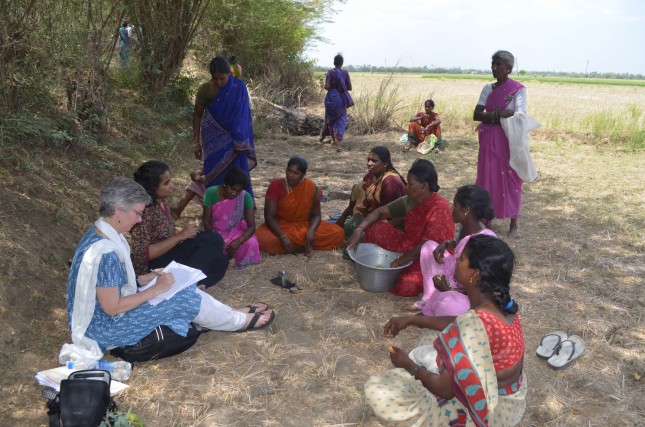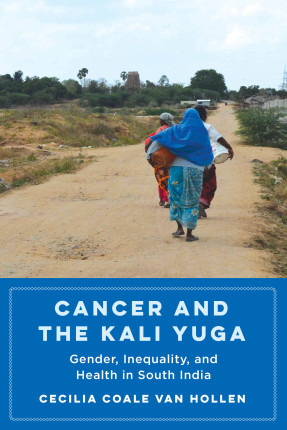-
Cancer and the Kali Yuga: Gender, Inequality, and Health in South India (Book Launch)
January 25, 2023 By Cecilia Van Hollen
Under the narrow shade of our umbrellas, a community health worker from a local NGO and I walked along a dirt path to the edge of some paddy fields in a village in Tamil Nadu, South India in the summer of 2015. There we met a group of Dalit (oppressed-caste) women who were squeezed together under a clump of trees on a small strip of raised land between two fields.
The summer of 2015 was one of the hottest on record in South India at that time, with temperatures consistently above 40ºC (104ºF) every day. Rains which should have begun to arrive had not come by mid-July. These women were hoping to be called for daily agricultural wage labor in the fields, and they had taken refuge under the shade while they waited. They had been waiting all morning with no work available; it had been the same for several days because there was a drought and the crops were failing.
We explained that I was a medical anthropologist, conducting fieldwork on low-income Dalit women’s perceptions and experiences with breast and cervical cancer. This was at a critical moment in the early 21st century when global, national, state and non-governmental public health organizations were concerned about rising rates of cancer in India and were stepping up efforts for the prevention, screening, and treatment of these two reproductive cancers.
There was a resounding consensus among these women that cancer was on the rise in their communities. The reasons were manifold: unemployment and poverty, conditions of gendered labor leading to physical exhaustion and mental stress, increased use of agricultural chemicals, and more frequent droughts from climate change. These phenomena were poisoning, weakening, and sickening women’s bodies in modern times.
One elderly, white-haired woman was having difficulty getting her raspy voice heard among the din of the other voices. She stood up and came to sit beside me and spoke right into my ear, saying: “Cancer is a sign of the Kali Yuga. It has come because of the way we live, because of agricultural chemicals in our food, and lack of work. It was not like this when I was a young girl. This is the Kali Yuga.”
A Dark, Unjust Era
My fieldwork in 2015 and 2016 included many such group discussions with Dalit women, as well as interviews with forty-two primarily rural Dalit women from all over Tamil Nadu who were being treated for these cancers (or were survivors) when I met with them. Their stories are at the heart of my recently published book, Cancer and the Kali Yuga: Gender, Inequality and Health in South India (University of California Press, 2022).

The Kali Yuga is a Hindu concept that refers to a dark, unjust era. References to the Kali Yuga surfaced repeatedly during my research as Dalit women discussed cancer and its causes and effects. They saw cancer as a modern disease resulting from corporate greed and government corruption, as well as from rising unemployment and the physical exhaustion of overwork. The drought and poverty they experienced also played a role. Many spoke about the effects of agricultural chemicals and lack of nutrition. Others attributed cancer and its attendant suffering to unequal gender relations and irresponsible husbands. Some women even blamed uncaring gods and goddesses.
As these socioeconomically marginalized women reflected on cancer, they also reflected on the world around them. For them, cancer was a problem that needed explanation on both individual and social levels. They deployed the idiom of the Kali Yuga and its implicit degradation of dharma (proper conduct) to make the case that the political, economic, and social structures of contemporary society are shot through with injustice.
These narratives reveal that women who are the targets of public health cancer interventions hold views about cancer causality, late diagnosis, and challenges to accessing treatment that differ from the public health discourse. Public health campaigns often link cervical and breast cancer risk to individual behavioral choices associated with sexual and reproductive practices, diet, and exercise. But these lower-income, oppressed-caste Tamil women attribute their risk of cancer to economic, environmental, and social factors beyond their control that render poor women’s bodies vulnerable to these cancers. Contrary to doctors who scold them for being irresponsible by coming to the hospital too late, or for having irrational fears and harmful superstitious beliefs, Dalit women who are cancer patients say their socioeconomic position constrains their search for cancer treatment and respectful care.
I met one woman who was diagnosed with Stage-I cervical cancer in 2014 but did not start treatment until two years later. Why? Because, she followed gendered expectations and deferred treatment to care for her husband who was being treated for oral cancer. By the time she started treatments, her cancer had progressed to Stage-III. Other women said they had been repeatedly misdiagnosed by multiple doctors before they finally received a cancer diagnosis by which time their cancers were also late-stage and harder to cure.
Both cervical and breast cancer patients also faced extreme stigma in the aftermath of their cancer diagnoses. They worried that people would not only mistakenly think they were contagious but would also question their morality and karma, thus throwing the prestige of their extended family into jeopardy. This stigma compromised their ability to openly access cancer treatments, sometimes leading them to combine shamanic healing with biomedical care, and forcing them to find creative ways to disguise their bald heads and missing breasts after oncological treatments.
Others patients and survivors praised the high-quality, free oncological care they received in government hospitals, but complained that they experienced endemic disrespectful care from public medical practitioners who were overworked and under-resourced.
Centering and Amplifying Dalit Women’s Voices
Breast and cervical cancer are the leading forms of cancer among women in India. The disparity in access to early screening and treatment for these cancers between low- and middle-income countries, such as India, on the one hand, and high-income countries on the other, is particularly glaring given the remarkable progress that has been made in treatment outcomes for both of these cancers if they are detected at an early stage.
One result of this disparity is that more women die from both cervical and breast cancer in India than anywhere else in the world. Increased access to screening, early detection, and treatment for cervical and breast cancer has the potential to save the lives of countless women in India. Yet social science research to understand Indian women’s experiences with these cancers and their views about causality, prevention, screening, and treatment has not kept pace with available public health and biomedical interventions. Deeper understanding of the perspectives, opinions, and constraints of the people for whom these health interventions are designed is crucial for the success of the programs.
Cancer and the Kali Yuga centers and amplifies the voices of Dalit Tamil women who situate cancer within the nexus of their class, caste and gender positions. Dalit women’s narratives about their experiences with cancer present a powerful and poignant critique of the sociocultural and political-economic conditions that marginalize them, jeopardize their health and well-being, and complicate their ability to heal. Yet their stories also demonstrate these women’s creative resilience and ability to navigate such constraints in order to endure.
While Cancer and the Kali Yuga examines these questions in a specific region, it holds larger lessons as well. Global and public health planners and medical practitioners involved in cancer prevention and treatment should take seriously the viewpoints of those who are the targets of their interventions in order to better appreciate the broader context of their lives and to improve health outcomes.
Dr. Cecilia Van Hollen is a professor in the Asian Studies Program at the School of Foreign Service at Georgetown University. She was a Public Policy Fellow at the Wilson Center in 2018 where she was writing the manuscript for Cancer and the Kali Yuga.
Sources: BMC Women’s Health, Britannica, International Agency for Research on Cancer, University of California Press.
Photo Credit: Cecilia Van Hollen conducting ethnographic research in Tamil Nadu, India in 2015. Photo by Shibani Rathnam.
 A Publication of the Stimson Center.
A Publication of the Stimson Center.




